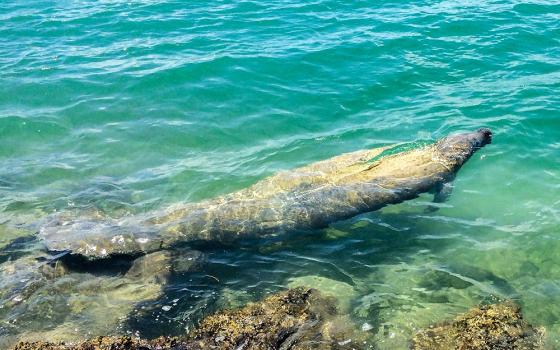
A manatee floats near the shore in Key Biscayne, Florida. (Unsplash/Debby Hudson)
Growing up near a lake in Florida, I learned that if I was quiet enough, I might hear the breath of a manatee as it floated to the surface for air. Catching a sign of these gentle "sea cows" always felt like magic. I might then see the water rippling in rings imprinted from the manatee's back. If the water was clear, I might even witness the creature as it slowly grazed along the lake's bottom, graceful, despite its size.
Not once did I see a manatee without scars sliced from a motorboat's blades. The white misshapen cuts on the creatures' gray backs taught me at an early age of the painful and sometimes deadly consequences of our drive for speed. It made me mad and sad.
These early encounters in creation as a child were the seeds of my environmentalism. I can trace in long lines how my love of manatees, cormorants, mullet, ospreys and other countless creatures led to my work decades later, today, at the Laudato Si' Movement. The burning desire to protect what I had fallen in love with manifested in a lifelong commitment to environmental justice.
This also was the beginning of my contemplative path, although back then I would not have named it as such. It was only when I entered a Cistercian monastery years later, where contemplating creation was woven into our daily life, that I awakened to my childhood immersions in nature as prayer.
Our planet is in crisis. And while there are a number of important responses to pursue — economic, technological, political — Pope Francis has said, "The best antidote against this misuse of our common home is contemplation."
If we see contemplation as a singular act isolated from action, this statement could seem like an escape. However, if one understands contemplation as a way of being to receive and respond to God's love in each moment, then the pope's statement begins to make more sense.
This week, we will be celebrating Laudato Si' Week, nine years since Francis signed the encyclical on integral ecology. One of the hallmarks of "Laudato Si', on Care for Our Common Home" was that it helped reframe the ecological crisis as a spiritual crisis. Francis quoted Pope Benedict XVI: "The external deserts in the world are growing, because the internal deserts have become so vast."
Advertisement
The reasons for these internal deserts are numerous. Our overuse of technology keeps us from being aware of the gifts of life and creation and the sufferings of our kin and our Earth. We get caught in the epidemic of indifference, numbing ourselves with overactivity while turning away from the suffering of those both near and far.
It is a subtle gesture, one that often does not look like conscious contempt for the plight of the poor but results from what Francis describes in Laudato Si' as "indifference induced by consumerism." A flood of other content or things dominate our consciousness to crowd out the needs of others.
We also get caught up in unhealthy compulsive habits, or what Francis calls "compulsive consumerism," because we are not aware of the interior impulses that drive our actions that can be destructive to ourselves and others.
"Many people know that our current progress and the mere amassing of things and pleasures are not enough to give meaning and joy to the human heart, yet they feel unable to give up what the market sets before them," Francis wrote in Laudato Si'.
And we forget who we are. We forget that we are creatures, not the Creator, and are inextricably linked and dependent on all life, all creation.
"Without contemplation, it is easy to fall prey to an unbalanced and arrogant anthropocentrism, the 'I' at the center of everything, which overinflates our role as human beings, positioning us as absolute rulers of all other creatures," Francis has said.
Despite these addictive and destructive habits, we know that things can change. As Francis has shared, the antidote is to nurture contemplation: "To contemplate is to grant oneself the time to be silent, to pray, to restore harmony to the soul, the healthy balance between head, heart and hands, between thought, feeling and action."
And in Laudato Si', he said that, through contemplation, we can experience interior peace, which "approaches life with serene attentiveness, which is capable of being fully present to someone without thinking of what comes next, which accepts each moment as a gift from God to be lived to the full."
'The best antidote against this misuse of our common home is contemplation.'
—Pope Francis
We can cultivate care as we feel called to "discover God's presence in his creatures and, with freedom and grace, to love and care for them," said Francis. We can make wise choices that support the well-being of the Earth and our kin. We can become like Jesus, who would "contemplate the beauty sown by his Father, and invited his disciples to perceive a divine message in things," Francis says in Laudato Si'.
The art of contemplation is simple, but not easy. It requires learning how to be still, to listen, to be present and to respond with love and compassion. Contemplation with creation, which is the focus of the work of the Laudato Si' Movement, incorporates contemplation with the body and nature, whether physical or in the imagination. It is possible. Like a gardener who uses her skill to cultivate the fields to allow for a fruitful harvest, we too can help cultivate our hearts and minds to allow for the fruits of contemplation and compassion to grow.
How do we do it? This blog series aims to be an exploration of the how and why of contemplation, especially in relation to creation.
How can contemplation be a way of deepening our relationship with God and creation? How do you contemplate? How can contemplation help us develop ecological habits, such as simplicity, humility and solidarity?
Most importantly, how can contemplation help us cultivate that interior peace that can be the foundation for right-relationship with ourselves, our God and each other, including creation?
We are all called to be contemplative. This is not just the work of monks or cloistered nuns. It is our calling as Christians and human beings who long to be joyful, compassionate and connected.
Like the contemplative I was at 12 years old on the edge of a Floridian lake, I imagine each of us can pinpoint a moment from our childhood when we stood in awe or in silence of something in nature. A contemplative moment.
Can we trust in our capacity, this God-given capacity, to open to the presence of God's love at every moment, through the grace of God? This is the work of contemplation. Let us journey together.




